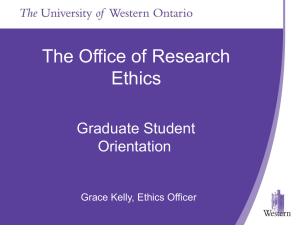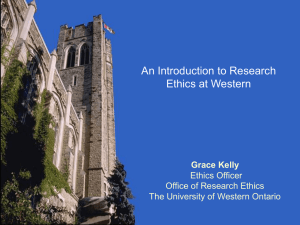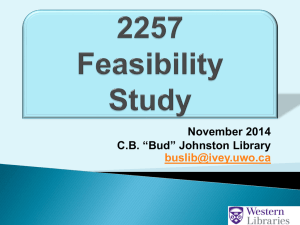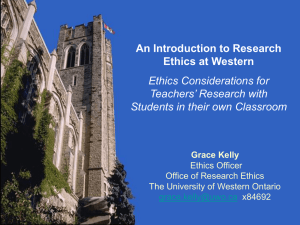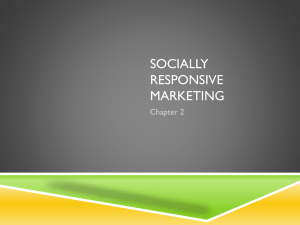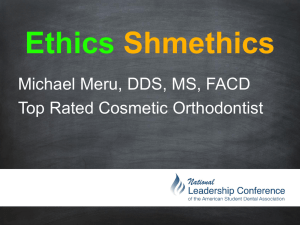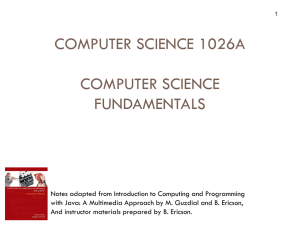Research Ethics & the Tri-Council Policy Statement 2
advertisement
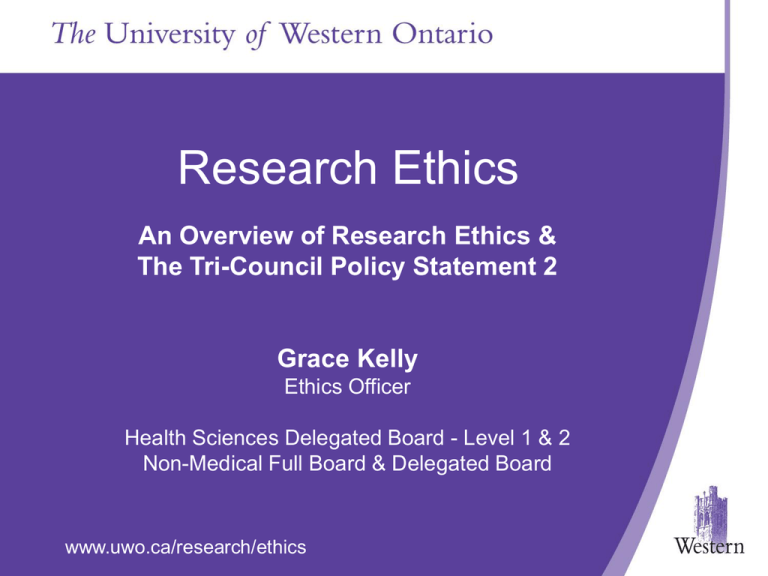
Research Ethics An Overview of Research Ethics & The Tri-Council Policy Statement 2 Grace Kelly Ethics Officer Health Sciences Delegated Board - Level 1 & 2 Non-Medical Full Board & Delegated Board www.uwo.ca/research/ethics The Office of Research Ethics plays an administrative role to two main boards here at Western: The Health Sciences Research Ethics Board (HSREB) The Non-Medical Research Ethics Board (NMREB) www.uwo.ca/research/ethics Each of these two main boards are divided further, based on the level of risk indicated in the protocol. HSREB (3) •Full Board, Delegated Level 1, Delegated Level 2 NMREB (2) •Full Board, Delegated •Faculty level sub-REBs www.uwo.ca/research/ethics Non-Medical Research Ethics Board Research that takes place outside of a medical or health care environment Research that does not relate to medical records or invasive procedures Faculties which must submit to the NMREB: Arts & Humanities Don Wright Faculty of Music Education Engineering Information and Media Studies Law Social Science Richard Ivey School of Business www.uwo.ca/research/ethics Delegated Review Any research that is deemed minimal risk or lower and does not use vulnerable participants, children or in some cases elderly. Minimal Risk: Research in which the probability and magnitude of possible harms implied by participation in the research is no greater than those encountered by participants in those aspects of their everyday life that relate to the research. www.uwo.ca/research/ethics Vulnerability Often caused by limited capacity, or limited access to social goods, such as rights, opportunities and power. Individuals or groups in vulnerable circumstances have historically included children, the elderly, women, prisoners, those with mental health issues and those with diminished capacity for self-determination. Ethnocultural minorities and those who are institutionalized are other examples of groups who have, at times, been treated unfairly and inequitably in research, or have been excluded from research opportunities. People or groups whose circumstances cause them to be vulnerable or marginalized may need to be afforded special attention in order to be treated justly in research. www.uwo.ca/research/ethics Tri-Council Policy Statement 2 (TCPS2) The TCPS2 is a policy that has been created as a benchmark for the ethical conduct of research involving humans. www.uwo.ca/research/ethics The Tri-Council Policy Statement 2 (TCPS2) •When do you need ethics approval? •What is informed consent and when is it needed? www.uwo.ca/research/ethics • ALL research involving human participants is subject to ethics review by an REB, even if approval may not be needed. • If you are doing research with humans please contact our office first. www.uwo.ca/research/ethics The following require ethics review and approval by an REB before the research commences: (a) research involving living human participants; (b) research involving human biological materials, as well as human embryos, fetuses, fetal tissue, reproductive materials and stem cells. This applies to materials derived from living and deceased individuals. www.uwo.ca/research/ethics The following MAY NOT require ethics review and approval by an REB before the research commences: Research that relies exclusively on publicly available information does not require REB review when: (a) the information is legally accessible to the public and appropriately protected by law; or (b) the information is publicly accessible and there is no reasonable expectation of privacy. www.uwo.ca/research/ethics REB review is not required for research involving the observation of people in public places where: (a) it does not involve any intervention staged by the researcher, or direct interaction with the individuals or groups; (b) individuals or groups targeted for observation have no reasonable expectation of privacy; and (c) any dissemination of research results does not allow identification of specific individuals. www.uwo.ca/research/ethics REB review is not required for research that relies exclusively on secondary use of anonymous information, or anonymous human biological materials, so long as the process of data linkage or recording or dissemination of results does not generate identifiable information. www.uwo.ca/research/ethics Quality assurance and quality improvement studies, program evaluation activities, and performance reviews, or testing within normal educational requirements when used exclusively for assessment, management or improvement purposes, do not constitute research for the purposes of this Policy, and do not fall within the scope of REB review. www.uwo.ca/research/ethics Creative practice activities, in and of themselves, do not require REB review. However, research that employs creative practice to obtain responses from participants that will be analyzed to answer a research question is subject to REB review. www.uwo.ca/research/ethics The Informed Consent Process (a) Consent shall be given voluntarily and informed. (b) Consent can be withdrawn at any time. (c) If a participant withdraws consent, the participant can also request the withdrawal of their data or human biological materials. www.uwo.ca/research/ethics Alternate forms of Informed Consent Certain types of research require alternate processes for seeking consent. Where elements of the consent process may need to be adapted to the requirements of a particular research project, the research ethics board (REB) can play an educational and consultative role in determining the appropriate process for seeking and maintaining consent. www.uwo.ca/research/ethics It should be noted that you ALWAYS still need to inform a participant of the research, the risks, benefits, etc. and they must consent to this. • Verbal Scripts • Explicit Consent by completion of a survey www.uwo.ca/research/ethics The University of Western Ontario Research Ethics Board (REB) and Office of Research Ethics (ORE) • • • • Deadlines Timelines Forms Romeo www.uwo.ca/research/ethics Deadlines – The ORE sets deadlines for each of its major boards • http://www.uwo.ca/research/ethics/deadlines.html NMREB Full Board – Deadlines – Delegated – No deadlines HSREB Full Board – Deadlines – Delegated Level 1 – No deadlines – Delegated Level 2 – Deadlines the same as HSREB Full Board www.uwo.ca/research/ethics Timelines –NMREB Full Board Review –Protocols are submitted on the deadline date –Reviewed by meeting date posted on our website –Recommendations sent out within 3 days of the meeting –NMREB Delegated Review –Protocols can be submitted at anytime –Reviewed within 2 weeks of being submitted –Recommendations sent out within 5 days of review www.uwo.ca/research/ethics Forms – The REB provides initial review and approval to a research project and the REB and the ORE provide ongoing post-approval review to research revision, etc. – We are currently in the process of going electronic with our submissions - ROMEO www.uwo.ca/research/ethics –ROMEO New electronic database currently used in-house. Within the next six months the ORE will be going live with the new online submission form. Training and education sessions institution wide. www.uwo.ca/research/ethics Thank you! We are always here to help. If you have any questions please contact Grace Kelly at 519-661-2111 ext. 84692 or grace.kelly@uwo.ca or Julie Pfeiffer at 519-661-2111 ext. 86811 or jpfeiff@uwo.ca www.uwo.ca/research/ethics Acknowledgements: Canadian Institutes of Health Research, Natural Sciences and Engineering Research Council of Canada, and Social Sciences and Humanities Research Council of Canada, Tri-Council Policy Statement: Ethical Conduct for Research Involving Humans, December 2010. http://www.pre.ethics.gc.ca/eng/policy-politique/initiatives/tcps2-eptc2/Default/ www.uwo.ca/research/ethics
